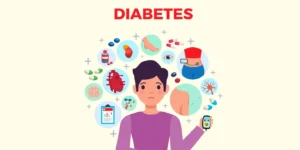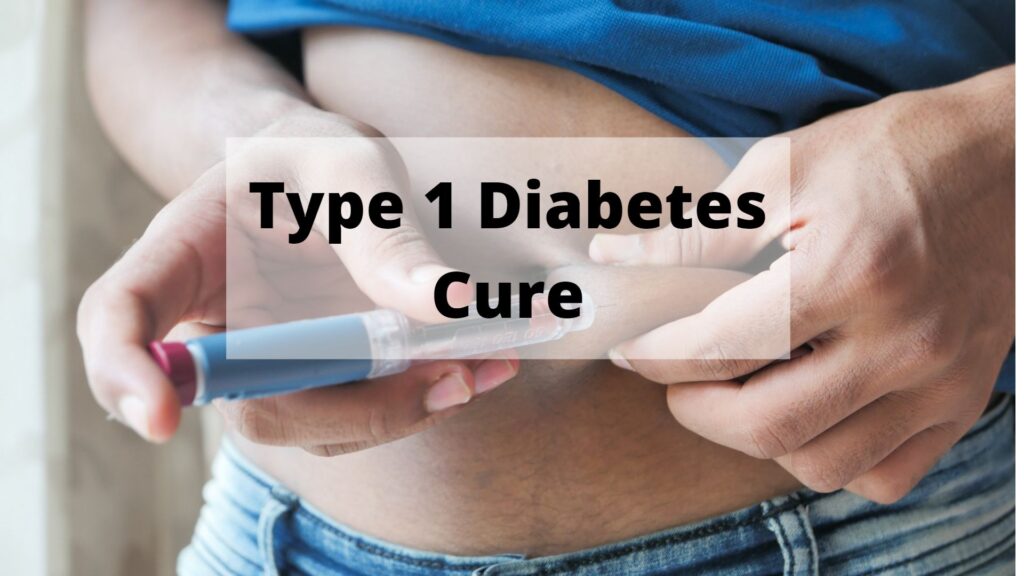Type 1 diabetes is a chronic condition that affects millions worldwide. Unlike type 2 diabetes, which is often associated with lifestyle factors, type 1 diabetes is an autoimmune disease where the body’s immune system attacks the insulin-producing beta cells in the pancreas. While there’s currently no known cure for type 1 diabetes, ongoing research has led to the exploration of various methods aimed at managing the condition more effectively or even potentially curing it. In this article, we’ll delve into some of these methods, ranging from conventional treatments to cutting-edge therapies.
Contents
What is Type 1 Diabetes?

Type 1 diabetes, also known as juvenile diabetes or insulin-dependent diabetes, is a chronic autoimmune condition in which the body’s immune system mistakenly attacks and destroys the insulin-producing beta cells in the pancreas. Insulin is a hormone that regulates the amount of glucose (sugar) in the bloodstream and facilitates its uptake into cells to be used as energy.
In individuals with type 1 diabetes, the destruction of beta cells leads to an absolute deficiency of insulin production. As a result, glucose accumulates in the bloodstream instead of being transported into cells, causing high blood sugar levels. This condition, known as hyperglycemia, can lead to various complications if not properly managed.
Common symptoms of type 1 diabetes include:
- Excessive thirst (polydipsia)
- Frequent urination (polyuria)
- Increased hunger (polyphagia)
- Weight loss despite increased appetite
- Fatigue and weakness
- Blurred vision
- Irritability and mood changes
- Ketosis (a buildup of ketones in the blood), which can lead to diabetic ketoacidosis (DKA) if left untreated
Can We Easily Cure Type 1 Diabetes?
Curing type 1 diabetes is a complex challenge due to the nature of the condition. Type 1 diabetes is an autoimmune disease characterized by the destruction of insulin-producing beta cells in the pancreas. Unlike type 2 diabetes, which is often influenced by lifestyle factors and can sometimes be managed or even reversed with lifestyle changes, type 1 diabetes is not preventable, and its underlying cause is primarily genetic and immunological.
While significant progress has been made in diabetes research and treatment, finding a cure for type 1 diabetes remains elusive for several reasons:
- Autoimmune Nature: Type 1 diabetes is fundamentally an autoimmune disease, meaning the body’s immune system mistakenly attacks and destroys its cells—in this case, the insulin-producing beta cells in the pancreas. To cure type 1 diabetes, researchers need to find ways to halt or reverse this autoimmune response without compromising the body’s ability to fight off infections and other threats.
- Complexity of the Immune System: The immune system is incredibly intricate, involving numerous cell types, signaling pathways, and regulatory mechanisms. Identifying specific immune cells responsible for attacking beta cells and developing targeted therapies to modulate these cells without causing widespread immune suppression is a significant challenge.
- Beta Cell Replacement: Even if researchers could halt the autoimmune attack, there’s the challenge of replacing the lost beta cells or finding alternative sources of insulin-producing cells. While islet cell transplantation has shown promise in some cases, it is still considered experimental and is not a widely available treatment option.
- Genetic Factors: Type 1 diabetes has a strong genetic component, with multiple genes implicated in disease susceptibility. Finding ways to correct or compensate for genetic defects associated with type 1 diabetes presents additional hurdles.
Different Methods to Cure Type 1 Diabetes
Curing type 1 diabetes remains a complex challenge, but researchers are exploring various approaches aimed at halting the autoimmune destruction of insulin-producing beta cells, restoring insulin production, and achieving long-term remission. Here are some of the different methods being investigated:
Immunotherapy
Antigen-specific Therapies:
- Peptide-based vaccines or antigen-specific T-cell therapy target specific antigens involved in the autoimmune attack on beta cells.
- These therapies aim to modulate the immune response, preventing further destruction of beta cells.
Immune Checkpoint Inhibitors:
- Immune checkpoint inhibitors block inhibitory pathways that suppress the immune response, enhancing immune activity against autoimmune cells.
- By releasing the brakes on the immune system, these inhibitors allow for a more robust immune response against beta cell destruction.
Tolerogenic Therapies:
- Tolerogenic therapies induce immune tolerance to insulin-producing cells, preventing autoimmune attacks.
- These therapies aim to reprogram the immune system to recognize beta cells as self and prevent further destruction.
Islet Cell Transplantation
Procedure Overview:
- Islet cell transplantation involves isolating insulin-producing islet cells from the donor pancreas and transplanting them into the recipient’s pancreas.
- The transplanted islet cells can restore insulin production and achieve insulin independence in some patients.
Immunosuppressive Therapy:
- To prevent rejection of transplanted cells, recipients require immunosuppressive drugs.
- Immunosuppression aims to suppress the recipient’s immune system, allowing the transplanted islet cells to survive and function.
Challenges and Limitations:
- Challenges include the scarcity of donor islet cells, the need for lifelong immunosuppressive therapy, and the risk of transplant rejection or complications.
Stem Cell Therapy
Cell Sources:
- Stem cells can be derived from various sources, including embryonic stem cells, induced pluripotent stem cells (iPSCs), and mesenchymal stem cells.
- These cells have the potential to differentiate into insulin-producing beta cells or modulate the immune system.
Differentiation and Transplantation:
- Stem cells can be differentiated into beta cells in vitro and transplanted into the pancreas to restore insulin production.
- Alternatively, stem cells can be encapsulated to protect them from immune attack and implanted into the body.
Gene Therapy
Gene Editing Techniques:
- CRISPR/Cas9 technology allows for precise editing of genes associated with diabetes susceptibility or immune function.
- Gene editing aims to correct genetic defects or introduce therapeutic genes to protect beta cells from autoimmune attacks.
Delivery Methods:
- Gene therapy vectors, such as viral vectors or nanoparticles, are used to deliver gene-editing tools to target cells.
- These vectors facilitate the transfer of genetic material into cells, allowing for targeted gene modification.
Artificial Pancreas
Components and Functionality:
- The artificial pancreas combines insulin pumps with continuous glucose monitors (CGMs) and automated algorithms.
- CGMs continuously monitor blood glucose levels, while the algorithms adjust insulin delivery based on real-time data.
Benefits:
- The artificial pancreas offers a more seamless and automated approach to diabetes management, reducing the need for frequent blood glucose testing and manual insulin dosing.
- By maintaining tighter control over blood sugar levels, it can help prevent hyperglycemia and hypoglycemia.
Dietary Interventions

Low-carbohydrate Diets:
- Low-carb diets restrict carbohydrate intake, reducing the need for insulin and minimizing blood sugar fluctuations.
- These diets focus on foods with a low glycemic index, such as non-starchy vegetables, lean proteins, and healthy fats.
Nutritional Therapy:
- Nutritional therapy involves personalized meal planning and carbohydrate counting to optimize blood sugar control.
- It emphasizes balanced nutrition, portion control, and regular meal timing to support overall health and well-being.
Exercise and Lifestyle Modifications
Benefits of Exercise:
- Regular physical activity improves insulin sensitivity, allowing cells to more effectively utilize glucose.
- Exercise also helps lower blood sugar levels, reduce insulin resistance, and promote weight management.
Personalized Exercise Plans:
- Tailored exercise plans take into account individual fitness levels, preferences, and diabetes management goals.
- Incorporating a mix of aerobic, strength training, and flexibility exercises can improve overall fitness and blood sugar control.
Stress Management Techniques:
- Stress can affect blood sugar levels by triggering the release of stress hormones like cortisol.
- Stress management techniques such as meditation, deep breathing exercises, and yoga can help reduce stress and promote emotional well-being.
Sleep Hygiene:
- Adequate sleep is essential for maintaining stable blood sugar levels and overall health.
- Practicing good sleep hygiene, such as maintaining a regular sleep schedule and creating a relaxing bedtime routine, can improve sleep quality.
Smoking Cessation Programs:
- Smoking can worsen diabetes complications and increase the risk of cardiovascular disease.
- Smoking cessation programs, including counseling and nicotine replacement therapy, can help individuals quit smoking and improve their overall health.
Alcohol Moderation:
- Alcohol consumption can affect blood sugar levels and increase the risk of hypoglycemia.
- Moderating alcohol intake and avoiding excessive drinking can help individuals with diabetes maintain better blood sugar control.
Social Support Networks:
- Building a strong support network of family, friends, and healthcare professionals can provide emotional support and practical assistance in managing diabetes.
- Support groups and online communities can also offer valuable resources and encouragement for individuals living with diabetes.
While each of these methods holds promise, further research is needed to refine their effectiveness, safety, and long-term outcomes. Additionally, personalized approaches that consider individual differences in disease progression and response to treatment are likely to be crucial in developing successful therapies for curing type 1 diabetes.
Tips To Keep in Mind While Curing Type 1 Diabetes
Here are some important tips to keep in mind while pursuing methods to cure type 1 diabetes:
- Healthcare Professionals: Always consult with healthcare professionals, including endocrinologists and diabetes specialists, before exploring any treatment or intervention for type 1 diabetes.
- Stay Informed: Stay informed about the latest research and advancements in diabetes treatment and cure. This will help you make informed decisions and stay updated on potential breakthroughs.
- Personalized Approach: Recognize that diabetes management and treatment can vary from person to person. Seek personalized treatment plans tailored to your specific needs, medical history, and lifestyle.
- Balance Risk and Benefit: Evaluate the risks and benefits of different treatment options carefully. Consider factors such as potential side effects, long-term outcomes, and the likelihood of success.
- Clinical Trials: Consider participating in clinical trials for experimental treatments or therapies. Clinical trials play a crucial role in advancing diabetes research and may offer access to cutting-edge treatments.
- Holistic Approach: Adopt a holistic approach to diabetes management that encompasses lifestyle modifications, such as healthy eating, regular exercise, stress management, and adequate sleep, alongside medical interventions.
- Monitor Blood Sugar Levels: Monitor your blood sugar levels regularly to track your response to treatment and identify any patterns or trends. Continuous glucose monitoring (CGM) systems can provide real-time data to help you make informed decisions about your diabetes management.
- Medication Adherence: If you’re on medication or insulin therapy, adhere to your treatment regimen as prescribed by your healthcare provider. Consistent medication adherence is essential for achieving optimal blood sugar control and preventing complications.
- Open Communication: Maintain open and honest communication with your healthcare team. Discuss any concerns, questions, or changes in your condition promptly to ensure that you receive the best possible care.
Conclusion
While a definitive cure for type 1 diabetes remains elusive, ongoing research and advancements in medical technology offer hope for better management and potentially even a cure in the future. From traditional insulin therapy to innovative approaches like stem cell therapy and gene editing, the landscape of diabetes treatment is rapidly evolving. By exploring and investing in these diverse methods, we can move closer to a world where type 1 diabetes is no longer a lifelong burden but a manageable condition.
Do you want to get rid of diabetes? Join our online diabetes treatment program and reverse Diabetes naturally through lifestyle changes such as a Personalized Diet plan, Exercise, Yoga, dieticians, and health coaches.

